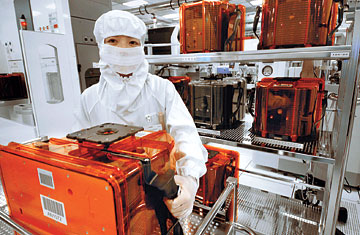
Wafer thin: With demand for goods like computer chips waning, Taiwan has no room to maneuver
John Luo, 38, never expected the global economic crisis to hit home. A well-paid deputy manager at a Taiwan semiconductor design outfit, he was a member of Taiwan's high-tech élite, accustomed to splurging on overseas vacations. But Luo's firm shut down in January, and now the former highflyer penny-pinches on $2 lunches, rides the bus instead of driving and is looking for a new job in a technology sector ravaged by recession. "Everything's uncertain," says Luo. "You can't just depend on hard work."
All of Taiwan is feeling that way. The island had hit upon an apparently fail-safe formula for growth — latching onto burgeoning global demand for tech hardware. Its manufacturers became top suppliers of notebook PCs, flat-panel monitors and semiconductors. But with demand for such expensive gadgetry waning, Taiwan's economy has become one of the most vulnerable to the downturn. Exports tanked 37% in January and February from the same period last year. GDP plunged 8.4% in the fourth quarter from a year earlier, the worst quarterly decline ever. The government predicts the economy will contract 3% in 2009; more bearish private estimates foresee a double-digit decline. (See pictures of TIME's Wall Street covers.)
The prized tech sector is in trouble. Nearly 4 out of 5 workers at the Hsinchu Science and Industrial Park, home base for many of the island's top tech firms, take unpaid leave at least once a week. Among the hardest hit are Taiwan's chipmakers. Amid a supply glut and deteriorating demand, prices have sunk for dynamic random-access memory (DRAM) chips, a key component of PCs, leading to large losses at Taiwan's manufacturers. The government is setting up a new DRAM company to revamp the local industry so it can compete with Korean rivals.
The most profound consequences of the economic crisis for Taiwan, however, could be political. The downturn could push Taiwan into the arms of China. (Beijing still considers Taiwan a breakaway province.) Despite growing trade and investment across the Taiwan Strait, Taiwan has resisted drifting wholly into China's orbit. But President Ma Ying-jeou believes that the only way to maintain Taiwan's competitiveness is to end its isolation. Ma wants to clear away remaining restrictions on investment and business activities by signing a comprehensive economic agreement with China that would allow for freer exchange of goods and services. The economic crisis "will draw Taiwan closer to China," says Yang Tai-shuenn, a political scientist at Chinese Culture University in Taipei. "We have few options." In these times, all choices are hard ones.
With reporting by Natalie Tso / Taipei